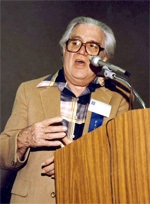Information
EP85 Conversation Hour 04 - Carl A. Whitaker, MD
Original Program Date :
Dec 11, 1985 (PST)
Length: 52:53
Description: Carl Whitaker explores the human experience of mental health through a radical family systems approach, challenging traditional psychiatric views. Drawing from his farm upbringing and personal encounters with schizophrenia, he advocates for holistic, intuitive therapy that treats entire families and views psychological challenges as complex human experiences rather than medical conditions.
Educational Objectives:
- To learn philosophies to various practitioners and theorists.
*Sessions may be edited for content and to preserve confidentiality*
Carl Whitaker, MD

Carl Whitaker, MD, was an American physician and psychotherapy pioneer family therapist. Whitaker is most well-known for acknowledging the role of the entire family in the therapeutic process. He is the founder of experiential family therapy, or the symbolic-experiential approach to therapy. Rather than scapegoating one family member or even a specific family problem, experiential family therapy looks at the entire family system. Several other approaches to family therapy have drawn heavily from Whitaker's theories.

